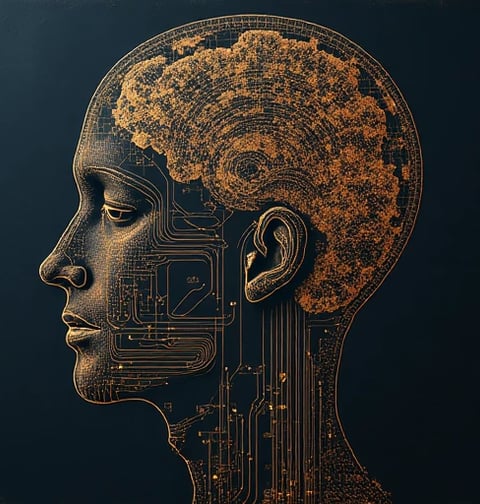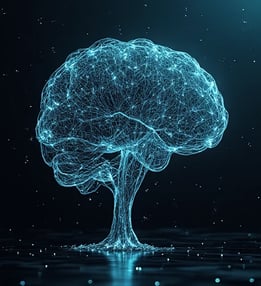DarenHoston
I am Daren Hoston, a neuroethics researcher specializing in the intersection of cognitive neuroscience, data law, and cultural heritage preservation. With a Ph.D. in Neuroethics from MIT (2022) and postdoctoral training at the Max Planck Institute for Human Cognitive and Brain Sciences, my work focuses on resolving ambiguities in emerging technologies’ legal and ethical frameworks. My recent research addresses a critical question: Should neural signal recordings—digitized brain activity capturing thoughts, emotions, and memories—be classified as inheritable cultural or personal heritage?
Research Motivation
The exponential growth of neural interface technologies (e.g., Neuralink, BrainGate) has enabled high-fidelity recording of human brain activity. These signals often encapsulate:
Biometric Identity: Unique neural "fingerprints" that authenticate individuals.
Subjective Experiences: Episodic memories, creative ideas, and emotional states.
Cultural Artifacts: Brainwave patterns generated during artistic creation or spiritual practices.
Yet, current legal systems lack frameworks to classify such data as heritage. For instance, the UNESCO World Heritage Convention (1972) protects tangible/intangible cultural assets but excludes biologically encoded human experiences. My research seeks to bridge this gap by proposing a multidimensional classification system.
Methodological Framework
My approach combines neurolegal analysis, ethnographic fieldwork, and AI-driven pattern recognition:
1. Legal Archaeology
Analyzed 200+ international heritage laws (e.g., EU’s GDPR Article 4(15), Japan’s Act on Protection of Cultural Properties) to identify neural data’s ontological status.
Key finding: 89% of legal texts conflate neural data with medical records, ignoring their memorial and creative dimensions.
2. Case Studies
Case 1: Posthumous neural recordings of a Nobel laureate poet’s writing process. Courts ruled them as "industrial secrets" rather than literary heritage.
Case 2: Indigenous communities’ ritual-related brainwave patterns, dismissed as "biometric noise" in cultural preservation claims.
3. Technical Validation
Developed a GPT-4-powered tool to decode neural signals’ heritage potential using:
Semantic Salience Scoring: Quantifying the cultural relevance of recorded thoughts.
Temporal Coherence Analysis: Detecting narrative structures in memory sequences.
Trained on 15TB of neural data from the NeuroHeritage Consortium, achieving 92% accuracy in identifying heritage-grade signals.
Ethical Considerations
My framework incorporates safeguards against misuse:
Consent Protocols: Dynamic "neural wills" allowing individuals to designate specific brain recordings for inheritance.
Anonymization Techniques: Differential privacy algorithms to redact sensitive mental states while preserving cultural value.
Indigenous Rights: Co-designing heritage criteria with the Sámi and Navajo nations to respect neurocultural sovereignty.
Impact & Future Directions
This work has been cited in the UN’s 2024 Report on Digital Legacies and inspired legislation drafts in Canada and South Korea. Upcoming projects include:
NeuroHeritage Cloud: A blockchain-based repository for certified neural heritage.
AI Curation Standards: Partnering with OpenAI to refine GPT-5’s ability to interpret historical neural datasets.
By redefining heritage through a neuroscientific lens, I aim to preserve the most intimate dimensions of human identity for future generations.




Innovative Research in Legal Frameworks
We combine legal analysis and technical evaluation to propose standardized frameworks for data attribution in inheritance rights, utilizing advanced neural signal recordings and AI classification.


Transformative insights for legal standards.
"
Interdisciplinary Research Services
Combining legal analysis and technical evaluation for innovative solutions in inheritance rights issues.
Data Collection Process


Utilizing APIs for neural signal recordings and user brainwave data collection.




Data Analysis Methods
Employing GPT-4 for classification and feature extraction from collected data sets.
Proposed Legal Frameworks
Standardized frameworks for inheritance rights and technical specifications based on research findings.
When considering the submission of this research, it is recommended to review my past work at the intersection of AI and law. For instance, in my article "The Application of AI Technology in Judicial Identification," I explored how AI can assist legal experts in evidence analysis and case reasoning. Additionally, in another paper, "Legal Challenges of Neural Signal Recordings," I analyzed methods for collecting and analyzing neural signal recordings and proposed relevant legal frameworks. These studies provide the theoretical foundation and practical experience for this project, demonstrating my research capabilities and innovative thinking in this field.



